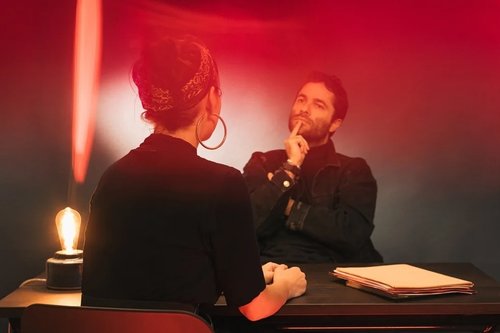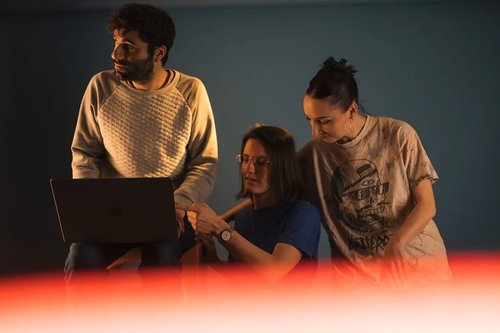7 improv theater tips to ace your job interview
Aug 17, 2022
4 mins


Journaliste freelance
The overlap between theater and job interviews may not be evident at first, but warming up, getting stage fright, and performing are part of both. Having a natural talent to perform well isn’t something we’re all born with, however, the art of improvisation can be learned! What if the techniques of this drama exercise could help us answer a trick question in an interview? Or nail it without having any interview preparation notes? We’ve put together some tips with the help of Aurélie Boukerche, public speaking coach, leadership instructor, and member of an improv group.
1. Warm up with tongue-twisters
This is the first point on which Boukerche insists: “When you go on stage, you warm up your voice.” To do this, she recommends trying the “tongue twister” method. This method involves reciting playful phrases to train your mouth, breathing, and articulation. For example, repeating “she sells seashells by the sea shore” a number of times until you don’t mess it up. These phrases can vary in difficulty and are known as aural illusions.
“This puts into practice the “3 V rule” of American psychology professor Albert Mehrabian, according to which 7% of communication is verbal - meaning and sense of words - 38% is vocal - tone and sound of the voice - and 55% visual - facial expressions and body language. In short, 93% of communication is non-verbal,” Boukerche notes. “Obviously, this doesn’t mean that you can say whatever you want in an interview. But it’s essential to prepare your body to go along with what you say, to ask yourself how you want to embody what you say, and strengthen your tongue while you’re at it.” For example, emphasizing consonants forces us to articulate correctly. And if that can help boost confidence when we’re not 100% sure of what we’re saying, we’ll take it!
2. Picture the interview as a game
According to Boukerche, “the secret of the improv actor is to have a good time and to focus on their partner. Having fun is key!” She recommends reading the book “Impro” by Keith Johnstone, in which the world-famous theatrical improv legend encourages us to get out of our heads and perform with our hearts in order to be in sync with our scene partner. “It’s the same thing in an interview! It should be a pleasant experience, where we talk about a potentially important position for both the company and ourselves. Staying positive is essential!” she smiles. During the interview, the desire to know what your interviewer is going to say or ask should supersede your stage fright.
3. Match the energy of your scene partner
Theater, and more particularly improv theater, calls for being here and now - it’s actually its main attribute. “By cultivating mindfulness, by striving to stay in the present moment, we are able to truly listen to the recruiter and actively respond. During an interview, this is fundamental because it allows you to bounce back on what the person shares with you,” explains Boukerche. “It’s also a way to try to match the person’s style. To someone who speaks quickly, we’ll answer with enthusiasm. If their sentences are short, we’ll try to avoid long winded responses. Active listening also develops agility. An improviser is simultaneously an actor, a dramatist, and a stage designer. They adapt immediately and manage to memorize what the other actor is saying in order rally with relevant responses or, even better, with humor. During an interview, these same qualities will be used to create a positive experience and understand in a very profound way the type of answers the recruiter expects.”
4. Embrace the silence
The thought of freezing up when asked a tricky or unexpected question in an interview haunts us all. However, taking the time to think about it is far from being a deal breaker. “In both improvisation and interviews, silence has its place,” says Boukerche. It gives each person time to digest the question before responding appropriately. Silence is precisely what sets the pace of the conversation: “I always advise counting to 5 in your head when you are surprised by a question. When you take the time to take a little break, miraculously, you get fresh ideas,” Boukerche recommends.
5. Use visualization and power poses to ward off stage fright
If there’s one subject that is common to both improv and interviews, it’s this one! To channel the anxiety that can be paralyzing, Boukerche has two foolproof tips. “The first is to do a visualization exercise. About three weeks before going on stage, I take the time to close my eyes for a few moments and I project myself. The brain doesn’t know the difference between the real and the virtual. It will therefore be less afraid on the big day because it will have already lived the situation.”
Then the coach puts forward another technique, which she admits is “a little ridiculous but so powerful.” This one comes from the social psychologist Amy Cuddy, who demonstrated how power poses can help in her Ted Talk “Your body language may shape who you are.” “The idea is to get into a Superwoman pose - hands on hips - or Superman pose - hands in the air - for about 3 minutes in front of a mirror, while saying a positive affirmation. This increases testosterone, which is the hormone of pride, and therefore boosts self-confidence,” adds Boukerche.
6. Use your body to control your stage fright
If you feel nervous during the interview, with a question that destabilizes you, for example, your body is your best weapon. Take the time to breathe, even if it means letting a few seconds pass. You can then concentrate on your supports: anchor your feet in the ground and lay your hands flat on the table. This will allow you to keep yourself upright and prevent stage fright from taking over. Also, this posture sends signals of confidence and assurance to the recruiter. A tried and tested tool to have in your back pocket!
7. Calm your ego
Last but not least, stay modest by staying as present as possible in your body. Allow your heart to speak rather than your head, where the ego resides. “In a job interview, it’s like being on stage: I’m not there to play the star, I don’t come to show off without humility. On the contrary, I’m there to talk about a subject that is close to my heart, namely the job in question, and above all to help the company make the right choice in terms of candidates. So be sure to avoid at all costs being in an ego-centric or pretentious state of mind.” The recruiter will spot it a mile away!
To sum up, to succeed in a job interview, using these few improv techniques can pay off! Once you learn how to alert your senses, listen actively, manage your stage fright, and be positive, you’ll be ready to strategically answer even the most unpredictable of questions. You’ll be sure to charm the recruiter!
Translated by Kim Cunningham
Photo: Welcome to the Jungle
Follow Welcome to the Jungle on Facebook, LinkedIn, and Instagram, and subscribe to our newsletter to get our latest articles every day!

More inspiration: Ace your job interview

Why are you leaving your job? Here's how to nail the answer
Caught off guard by 'Why are you leaving your job?' Here's how to flip this tricky question into a spotlight on your goals and potential.
Dec 24, 2024

Standing out in an interview: Creative responses to common questions
Answering common interviews with common responses isn't going to get you far in today's job market. Here's how to truly stand out!
Nov 26, 2024

The Pratfall Effect: Can screwing up in a job interview make you more likable?
Mistakes you make in a job interview could actually work to your advantage ...
Oct 14, 2024

How to bring up your long-term career goals in an interview
Be honest but strategic. The key is aligning your goals with the role while showing flexibility and ambition. Avoid faking it!
Sep 24, 2024

Is honesty the key to discussing your weaknesses?
Are your weaknesses holding you back in an interview? A bit of honesty can flip the script and make your flaws work in your favor.
Aug 21, 2024
The newsletter that does the job
Want to keep up with the latest articles? Twice a week you can receive stories, jobs, and tips in your inbox.

Looking for your next job?
Over 200,000 people have found a job with Welcome to the Jungle.
Explore jobs